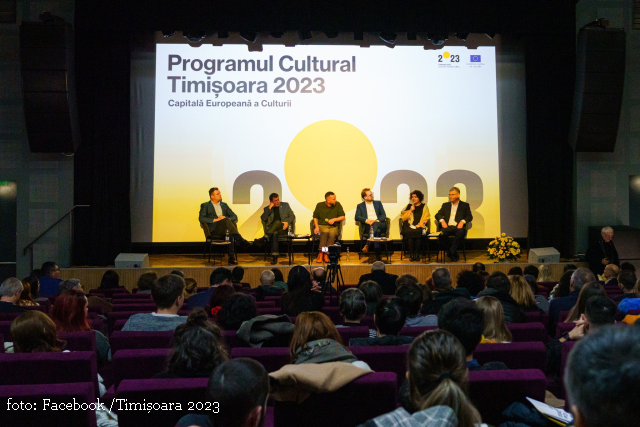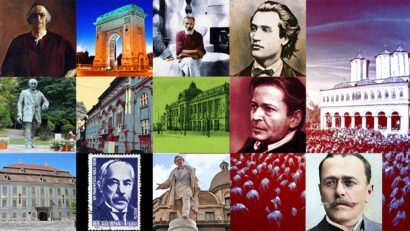Timişoara, European Capital of Culture in 2023
The city of Timişoara officially became a European Capital of Culture for the year 2023

Ștefan Baciu, 22.01.2023, 11:51
The very week when Romania celebrated the
National Culture Day, the city of Timişoara officially became a European
Capital of Culture for the year 2023.
The moment was marked on Monday, January 9,
with a ceremony in which the 2022 European Capitals of Culture handed over the
titles to the cities and regions that become Capitals in 2023: Elefsina (Greece),
Veszprém (Hungary) and Timişoara (Romania). Symbolically, the
ceremony was held in Athens, which was the first European Capital of Culture,
in 1985, when the project was initiated by the Greek actress, singer and
politician Melina Mercouri and the French politician Jack Lang, a promotor of
many projects in the field of culture.
With the motto Shine your light – Light
up your city!, Timişoara seeks
to showcase its cultural traditions and to demonstrate that it is a model of
tolerance, a place where various ethnic minorities and cultures live together.
Also
known as the city on the Bega, after the river and navigable canal that crosses
it, Timişoara stands out, among other things, thanks to its 3 state theatres,
with performances in Romanian, German and Hungarian. Timişoara is also dubbed little
Vienna, due to the architecture of its heritage buildings.
The official launch
of the 2023 European Capital of Culture programme took place on February
17. Vlad Tăușance, a member of the Timişoara 2023 curatorial team, told us
about the event:
Vlad Tăușance: The Timișoara
2023 European Capital of Culture opening weekend is designed as a feast of the
entire city, as well as an opportunity for cultural operators to give the
public in Timișoara, in Romania and around Europe a preview of what the Timișoara
2023 programme will look like. Whether we talk about exhibitions, performances,
concerts or community events, this opening weekend is a festive moment, a celebration
if you want, of the entire Timișoara 2023 European Capital of Culture year. We
have scheduled more than 50 events, of various proportions and on various themes,
from a large concert for the general public in the Union Square, in Timișoara, with
international artists from Serbia, Bulgaria and more joining local bands, with
genres ranging from electronica to rock to world music, with a special
appearance by the Romanian group Taraf de Caliu. It is a special event, complete
with an aerial dance show by Moale, a group from Spain well known
for its electrifying performances.
A major pillar of
the Timișoara 2023 European Capital of Culture opening weekend is the
exhibition series:
Vlad Tăușance: On
the one hand we have a collective exhibition called Chronic Desire, an
exhibition that brings together over 30 artists from Romania and Europe. It is
a mix of emerging artists and celebrated names, which make the headlines in major
art biennales around the world or are included in the collections of important
museums. What connects all these artists is the theme of the exhibition:
Chronic Desire. A need for meaning, a need for new definitions for a Europe
that is truly facing rather uncomfortable realities, whether we talk about
identity crises, aggression, climate change or war. It is a very interesting exhibition,
intended to give the public food for thought, to challenge them to find their
own answers to important questions of today. This is, in fact, one of the key
goals of the European Capital of Culture programme. Beyond the spectacular
element, so to say, the festive moments celebrated together, this title is also
about introspection, about searching together and finding together new definitions
for what Europe means, where it begins, where it ends and, more importantly,
where it is headed to.
The multiculturality
of the city on the Bega will be showcased in the events hosted this year, Vlad Tăușance from the Timişoara 2023 curatorial team also told us:
Vlad Tăușance: The
National Theatre, for instance, is preparing what I could call a spectacular
programme, with the most important names in choreography and contemporary drama.
The Philharmonic is preparing collaborations with orchestras in Germany and
other countries. We have guests from around Europe in various projects, including
forum theatre or social theatre, art residences, events in unconventional
venues. This kind of multiculturality is also reflected in the opening of
venues that are not usually open to alternative culture or the general public,
and I mean churches or other religious centres, which will host both jazz
performances, experimental music shows and even theatre plays. This mobilisation
is unprecedented in the history of the city, and with all modesty I would say
in Romania’s recent cultural history as well.
It was in Timişoara that
the first navigable canal in Romania was first built, in 1732, and in 1884 Timişoara
was the first European city to use electric lighting. In December 1989,
Timişoara was the city where the anti-communist uprising started, which days
later led to the fall of the communist regime in Romania. And this year, once
again, Timişoara aims to prove that it is a pioneering city. (AMP)




























